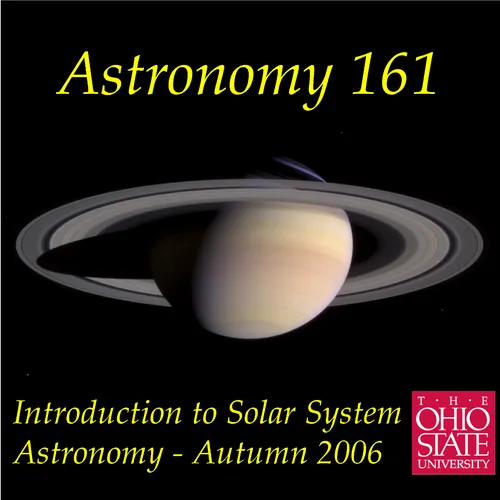
Astronomy 161 - Introduction to Solar System Astronomy
Astronomy 161, Introduction to the Solar System, is the first quarter of
a 2-quarter introductory Astronomy for non-science majors taught at The
Ohio State University. This podcast presents audio recordings of
Professor Richard Pogge's lectures from his Autumn Quarter 2006 class.
All of the lectures were recorded live in 100 Stillman Hall on the OSU
Main Campus in Columbus, Ohio.
- Update frequency
- every day
- Episodes
- 47
- Years Active
- 2006 - 2009

Lecture 27: Deep Time - The Age of the Earth
How old is the Earth? This lecture reviews the idea of cyclic and
linear time, since how you view time determines whether the question of
the age of the Earth is even meaningful. We then review var…
Mon 30 Oct 2006

Lecture 26: Telescopes
Telescopes, equipped with advanced electronic cameras and spectrographs,
are the primary tools of the astronomer. This lecture reviews the types
of telescopes and observatory sites, and discusses ra…
Fri 27 Oct 2006

Lecture 25: Measuring Light - Spectroscopy
Why does each chemical element have its own unique spectral-line
signature? How do emission- and absorption-line spectra work? This
lecture is the second part of a two-part exploration of the inter…
Thu 26 Oct 2006

Lecture 24: Matter and Light
How do matter and light interact? This lecture is the first of a
two-part lecture on the physical basis of spectroscopy. Today we will
discuss the Kelvin Absolute Temperature scale, which provides …
Wed 25 Oct 2006

Lecture 23: Worlds Within: Atoms
What is Matter? This lecture reviews the nature of matter from
subatomic to atomic scales, and introduces the ideas of atomic
structure, atomic number (number of protons), the elements, isotopes,
ra…
Tue 24 Oct 2006

Lecture 22: Light the Messenger
What is Light? This lecture reviews the basic properties of light,
introducing the inverse square law of brightness and the Doppler Effect.
Recorded 2006 Oct 23 in 100 Stillman Hall on the Columbus …
Mon 23 Oct 2006

Lecture 21: The Rotation and Revolution of the Earth
How do we prove physically that the Earth rotates on its axis and
revolves around the Sun? Newtonian physics was so compelling that it
was mostly accepted before there were ironclad physical demonst…
Thu 19 Oct 2006

Lecture 20: Tides
Why are there two high tides a day? This lecture examines another of
the consequences of gravity, the twice-daily tides raised on the Earth
by the Moon. Tides are a consequence of differences in th…
Wed 18 Oct 2006

Lecture 19: Orbits
Why do Kepler's Laws work? This lecture discusses how Newton applied
his Three Laws of Motion and the Law of Universal Gravitation to the
problem of orbits. Newton generalized Kepler's laws to appl…
Tue 17 Oct 2006

Lecture 18: The Apple and the Moon - Newtonian Gravity
What is Gravity? This lecture reviews the law of falling bodies first
described by Galileo, and then Newton's explanation in terms of his Law
of Universal Gravitation. Gravity is a mutually attract…
Mon 16 Oct 2006

Lecture 17: On the Shoulders of Giants: Isaac Newton and the Laws of Motion
The work of Copernicus, Kepler, and Galileo all contributed to a new way
of looking at the motions in the heavens, but did not explain why they
move that way. Enter Isaac Newton, who within a few ye…
Fri 13 Oct 2006

Lecture 16: Galileo and the Telescope
Tycho did as much as could be done with the naked eye, a new technology
was required to extend our vision, the telescope. This lecture
introduces Galileo Galilei, the contemporary of Kepler who was …
Thu 12 Oct 2006

Lecture 15: The Watershed: Tycho and Kepler
In the generation following Copernicus, the question of planetary
motions was picked up by two remarkable astronomers: Tycho Brahe, the
brilliant Danish astronomer whose precise measurements of the p…
Wed 11 Oct 2006

Lecture 14: The Revolutions of Nicolaus Copernicus
In 1543, Nicolaus Copernicus re-introduced the Heliocentric idea of
Aristarchus of Samos in an attempt to purge Ptolemy's geocentric system
of the un-Aristotelian idea of the Equant. His goal was to…
Tue 10 Oct 2006

Lecture 13: Greek Astronomy
What are the origins of the Geocentric and Heliocentric models
put foward to explain planetary motion? This lecture begins a new
unit that will chart the rise of our modern view of the solar system …
Mon 09 Oct 2006

Lecture 12: The Wanderers - Planetary Motions
How do the planets move across the sky? This lecture will review
planetary motions, specifically the apparent motions of the five
classical planets (Mercury, Venus, Mars, Jupiter, and Saturn) as see…
Thu 05 Oct 2006

Lecture 11: The Calendar
Why are there leap years? This lecture explores the astronomical
origins of the calendar. We will discuss lunar and solar calendars and
their hybrids in history and tradition (for example, the Isla…
Wed 04 Oct 2006

Lecture 10: Telling Time
What time is it? This lecture is the first part of a two-part
exploration of the astronomical origins of our time-keeping and calendar
conventions. Today we will discuss the division of the year in…
Tue 03 Oct 2006

Lecture 9: Eclipses of the Sun and Moon
Eclipses of the Sun and Moon are among the most glorious spectacles in
the sky. This lectures looks at the causes and types of eclipses, and
how often they occur. Recorded 2006 Oct 2 in 100 Stillma…
Mon 02 Oct 2006

Lecture 8: Phases of the Moon
How does the Moon appear to move through the night sky? This lecture
introduces the Moon, and describes the monthly cycle of phases. Topics
include synchronous rotation, apogee and perigee, the cyc…
Fri 29 Sep 2006
Disclaimer: The podcast and artwork embedded on this page are the property of Richard Pogge. This content is not affiliated with or endorsed by eachpod.com.